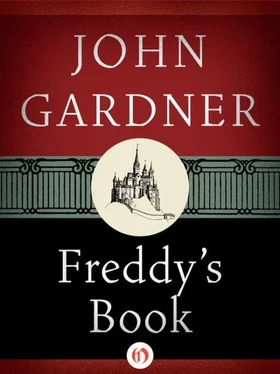The rooms now seemed larger, more foreign than before. As they moved down the hall toward their bedroom, candlelight flickering on the walls, his wife said, “They talk of you all the time, Lars-Goren.” She gave his hand a squeeze.
Like a man standing back from himself, he watched how his heart gave a leap at those words. He shook his head, grieving and rejoicing, and opened the bedroom door. When they’d entered and he’d closed the door behind them, she turned to face him, smiling. He took the candle from her, seizing it awkwardly, so that he burned the palp of his thumb on hot wax and very nearly let the candle fall, then composed himself and set the candle in the holder on the table beside the bed. She waited. He returned to her and took both her hands, studying the smile. After a moment, for the first time since he’d arrived, they kissed. The feeling of strangeness and guilt fell away; he understood by sure signs that, odd as it might seem, he was the joy of her life, as she was of his. He held her in his arms bending down so awkwardly that he was tempted to laugh at the absurdity of things — this huge man, this small woman — and he pressed his cheek to hers, then bent down more and kissed her shoulder.
When his wife lay asleep in his arms, he stared at the ceiling, not thinking but floating in the sensation of being home. It seemed a long, long way from where the Devil schemed and plotted. Indeed, it was hard to believe in the Devil’s existence, here in his own long bed, with his wife. Yet the Devil was real enough, he knew, somewhere far away — or maybe not so far away. He thought of the toothless old woman who had smiled and waved, then fled, and the shadow of movement that might or might not have been a deer. As he drifted toward sleep, he thought briefly of the distance he’d felt between himself and his children, even between himself and Liv; thought of how he’d failed to take his son in his arms, and how he’d hoped no one would see him as he passed through the villages in his keeping. Not that one could call that the Devil’s work, exactly. He struggled to rise back out of sleep and think, fight off the fear surging up in him, but someone was muttering, an old Lapp with brown eyes, beating with his fingertips on a drumhead on which lay three stones.
3.
IN THE MORNING, LARS-GOREN looked through the records of his glum old groundskeeper, veteran of many wars — an exasperating man when he got off on his exploits — and reviewed the accounts of the village managers. By ten he’d talked with all his lesser officials. When he’d approved or disapproved the peasant requests that had been set down in writing to await his return, dealt with small complaints and one slightly larger one, the request of some villagers that a certain old woman be burned for witchcraft, a charge they supported with positive proof, Lars-Goren announced his intention of riding out for a first-hand look at his villages and lands. He invited his twelve-year-old, Erik, and his ten-year-old, Gunnar, to ride with him. His wife and the cook prepared a lunch for them, on the chance that they should find nothing to their liking in the peasant kitchens or the village inns; and the groom brought around three horses and gave Gunnar a leg up. “I’m all right,” the boy protested, but only for show, accepting the help. Gunnar was red-headed and freckled, still chunky and dimpled like an infant, and though his grin boasted confidence, he was secretly afraid of horses, as all of them knew. Erik sat very tall, comfortable in the saddle, and watched his younger brother’s struggles with friendly detachment and the patience of an adult. Lars-Goren, covertly watching his elder son, felt a shower of pride and felt, at the same time, even more remote than he’d felt last night in Erik’s bedroom. Somehow without Lars-Goren’s help, or so Lars-Goren imagined, the boy had become all any father could have wished. It crossed his mind that Erik would soon be old enough for war. Hastily, to distract himself, Lars-Goren glanced behind him, making sure that Lady, his spaniel, was not too close to the horses’ hooves.
Seeing him turn to look at her, Lady yapped officiously, then growled low in her throat and feinted at the fetlock of the horse’s left hind leg and yapped again, showing her master in her own way that she had everything in hand — have no fear, she was paying close attention! Lars-Goren laughed at the dog and at himself, then glanced at Erik and saw that he was smiling. “How I love that boy!” he thought; then, glancing at Gunnar, seeing how he was still smiling with pretended confidence, a dimple cut deep into his right cheek, but his pupils cocked downward, exactly like those of a colt in alarm, Lars-Goren corrected himself, “How I love all of this! Erik, Gunnar, my wife, my girls, the peasants who look to me for defense, this glorious land—!”
Now everything was ready. His wife and two daughters waved to him from the arch. Lady stood poised, looking up at him, meaning to take her first step the same instant his horse did. He made one last check glancing at the cinch-straps, his younger son’s two-handed grip of the reins — he held them high over the withers and sat unnaturally erect, like a circus performer. Then, since all was well, Lars-Goren leaned slightly forward and, as if part of one motion, quick and sure — quicker than Gunnar had expected, judging from his face — the horses and dog began to move. At a half trot Lars-Goren’s horse Drake, one ear cocked back in case Lars-Goren should whisper, led them down the hill and, at the faintest suggestion of a signal from Lars-Goren, angled through a break in the hedge, took an easy little ditch (Lars-Goren glanced back at Gunnar, whose eyes briefly widened in alarm but all was well), and headed crosslots through the fields in the direction of the nearest of the villages.
The sun was high, the day warm. In the second field they came to, peasants were cutting and shocking rye, working, as always, in their dark, heavy clothes, dark round hats or kerchieves, working quickly, as they never did at any other season, since the weather would allow them only three or four weeks to get the grain in the bins, the hay harvested, and the land reploughed. Lars-Goren rode straight to where a group of them were loading up a wagon. They stopped their work as he approached and straightened up to greet him; a few raised their arms in a two-handed wave. It was as if he hadn’t seen them in years, he thought. After months of war and weeks of Stockholm, they were like apparitions from another century, black-garbed and wrinkled, even some of the youngest of them toothless, their smiles open and innocent. Even their language was at first strange to him, though he’d heard it all his life. But almost at once, almost as soon as he’d registered it, the strangeness fell away and he was one of them.
An old man with a gray moustache and beard put his hand on the side of Drake’s neck. Lady, wagging her tail, stood close to the peasant and looked up at Lars-Goren making sure it was all right.
“Good to have you back, sir,” the peasant said.
“Good to see you well,” Lars-Goren answered.
The old man smiled and looked over at Erik, then Gunnar. “Big boys,” he said, and shook his head as if the fact saddened him.
“They’ve grown, all right,” said Lars-Goren. “And how are yours?”
The peasant’s smile came back, wide and toothless. “Six grandchildren now,” he said, “all strong as oxen, two more on the way. So far, all boys!”
“God keep them!” said Lars-Goren, with more feeling than he understood.
Tears came suddenly into the peasant’s eyes. “And the same to you and yours!” he said. He gave a pat to the horse’s neck as if to end the conversation.
Lars-Goren glanced at Gunnar. The boy was watching with great curiosity as an old woman with hands so stiff they would hardly bend stood dabbing at the corner of her mouth with the end of her black kerchief. What Gunnar was thinking Lars-Goren couldn’t tell, but he saw that the old woman’s legs were shaky; she was too old and weak to be working in the fields. Lars-Goren threw a questioning look at the peasant he’d been talking with.
Читать дальше











